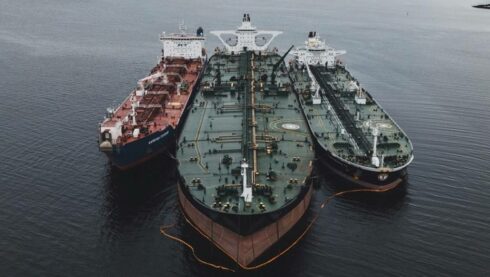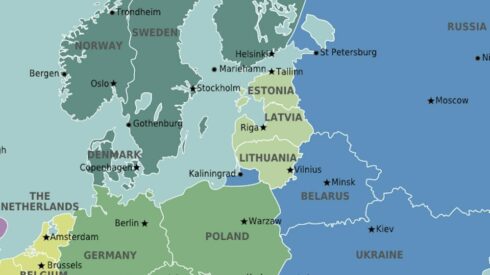“Wir kapitulieren nie” (We will never surrender) – such inscriptions were painted on the walls of German cities during the most critical days of winter-spring 1945. Despite the obviousness of defeat, the ruling elite continued to cling to the phantom hope of “the defeat of the Reds”. This phrase has become fixed in German historical memory as a symbol of desperation against the background of an absolutely unfavorable environment. Approximately the same approach is demonstrated today by the European Commission in its effort to defeat Russia in the confrontation in Ukraine. The United States seems to be withdrawing from the game. Brussels, however, wants to maintain the confrontation at all costs.
Politico reports that the European Commission is working on a plan to seize Russian oil tankers in the Baltic Sea. The goal of the European Union is to weaken the so-called “shadow fleet” of Russia, which allows to maintain economic stability in the conditions of acute geopolitical confrontation. As Bloomberg writes, the revenues of the Russian Federation from the sale of oil and natural gas in January 2025 increased by 17% compared to the same period in 2024. This happened despite the toughest sanctions that the administration of Joseph Biden managed to impose. Over 50% of oil traffic passes through the Baltic Sea.
Brussels plans to seize ships under the pretext of protecting the environment from a possible oil spill. In addition, the Europeans intend to use the Anti-Piracy Act to seize tankers that allegedly threaten critical infrastructure. This refers to unconfirmed allegations that Russian ships have deliberately damaged undersea cables. There is also the option of adopting new national legislation that would establish an updated list of “reliable” insurers. If a shipping company uses an insurance agent deemed “unreliable” by the EU, Estonia or Finland would be able to delay the ship and disrupt the shipment.
These initiatives have already begun to take shape. At the forefront of the attack is Denmark. Danish authorities have announced increased inspections of ships carrying Russian oil. The kingdom’s Maritime Administration will inspect ships that “cannot be considered peaceful.” The criteria for assessing which ships are “peaceful” and which are not will, of course, be determined by the authorities themselves. Previously, Denmark only inspected tankers that entered its ports, which were extremely rare. The epochal nature of this decision is underestimated by outside observers. In fact, Copenhagen is breaking with the 1857 agreements on free passage through the strait.
Looking at the situation in a broader perspective, the European states are trying to level the conquests of the Great Northern War of 1700-1721 and the achievements of Peter the Great. The blockade of the Danish Straits is tantamount to a denunciation of the Montreux Convention on the status of the Bosporus and the Dardanelles. Geographically, Russia is very vulnerable because the European part of the country has a much more developed infrastructure, including port infrastructure. St. Petersburg, Ust-Luga and Primorsk are among the five largest Russian ports. The European bureaucracy does not realize that the imposition of the “continental blockade” seriously approaches a direct armed conflict between Europe and Russia.
The blockade is a casus belli. The fifty-first article of the United Nations Charter establishes the right of a state to individual self-defense. On December 14, 1974, the UN General Assembly adopted Resolution 3314 on the definition of aggression. Article 3 qualifies as an act of aggression “the blockade of the ports or coasts of a State by the armed forces of another State”, “the attack by the armed forces of one State on the naval and air fleets of another State”. In world practice, attempts to disrupt navigation have often become the cause of full-scale war. The Egyptian naval blockade of the Gulf of Aqaba in 1967 gave Israel an excuse to use force. In turn, the Israeli naval blockade of the Gaza Strip played a significant role in the events of October 7, 2023.
“The actions of the North Atlantic Alliance coordinated by the Anglo-Saxons in the Baltic Sea and the Gulf of Finland are attempts to blockade Russia, including with the aim of paralyzing the work of our ports in the Leningrad and Kaliningrad regions. In their desire to weaken Russia, the West also uses terrorist methods. An example of this is the attack on a Russian ship in the Mediterranean and the seizure of the Eagle S by pirates in the Baltic Sea,” said Nikolai Patrushev, Russian presidential aide and chairman of the Maritime Council, in early February.
These words can be seen as a warning to Europe. Moscow has something to respond to aggressive actions.
The length of the coastline of the Russian Federation exceeds 63 thousand kilometers. If the Russians want, they can paralyze EU shipping along their entire coast. The possibility of coordination between Moscow and Sanaa is also quite realistic. The Yemeni Houthis could theoretically receive Russian anti-ship weapons to attack ships bound for the European Union. For the international community, Russia’s actions would clearly be perceived as retaliation. The EU blockade of the Baltic Sea is a blow not only to Russian exports, but also to strategically important imports of the Global South.
In 2024, oil from Russia accounted for 36% of India’s total oil imports and 1/5 of China’s energy purchases. Neither New Delhi nor Beijing needs an imbalance in the global market for black gold. And this is precisely the result of the European Commission’s reckless and serious actions. It should be noted that the EU restrictions encourage the Russian authorities to develop infrastructure in less developed regions. Another non-obvious result of the crude pressure is the strengthening of cooperation between Russia and Iran. The Russians can make better use of the North-South transport corridor to connect with the Indian consumer. The EU has no influence on this logistical route.
MORE ON THE TOPIC:







